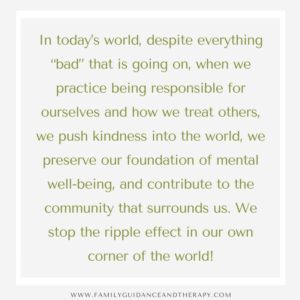You may have heard of the ripple effect. Throw a rock into a pool of water. As the rock breaks the surface and pushes its way down, water near the surface rushes back into the space it left behind. Human emotions and feelings react similarly when they are disrupted by a lack of caring or sympathy. The water (consisting of feelings and emotions) pulls, pushes, and rushes around, attempting to find a natural and calm space—disturbing every inch of nearby surroundings.
The recent political situation has brought on a plethora of ripple effects. Scratch that—the word tsunami is a much better fit, as its effect is often disabling.
Should we lack empathy and incapacitate other’s peace and mental well-being just because they do not agree with us?
We can easily slip into a negative mode when we allow ourselves to remain in the muck of life and not wash it off. That nasty coating becomes a barrier to being responsible for ourselves, our mindset, and our healthy treatment of others.
So, what do we do to keep ourselves from wallowing in life’s normal situations, or perhaps circumstances that are not so normal but seem to pile one on top of the other? How do we stay soft of heart despite life’s difficulties, including when others are not in agreement with our personal choices?
Avoid the Victim Mentality
A victim is defined as a person who has been attacked, injured, killed, or misled by a person or an event.
We all fall victim to life’s challenges and difficulties. Life does not imitate an empty script. How we manage ourselves through life’s ups and downs is key to maintaining our mental well-being, as well as preserving our empathy and kindness for others.
We can take on the victim mentality and believe, “I have the right to be harsh today because nothing is going well (pandemic, COVID, politics, economy)…no wonder I feel so mean,” and this can easily turn into habitual thinking and harden our hearts, or, we can choose to stop blaming others or life’s circumstances for our behavior and actions, and turn our attention away from the things that we cannot change.
Own What You Believe in and Change What You Can
Own what you are feeling, or what you believe in, but protect your heart from hardening. You can disagree and at the same time retain empathy. You can agree to disagree.
There are many situations in life that we simply cannot change. We can only give it our best.
Journaling
Journaling is a great tool for decision making. When facing challenges, list what you can change. List the ways you can improve the situation. Perhaps the only way you can make a change is to shift your own mindset.
Journal pledges to yourself to promote a sense of self-responsibility, change, and a soft heart:
“I will partake in self-care today by doing (…).” This will help my mood and mental well-being.
“I will be kind, despite my feelings today.” This will help me maintain a soft heart.
“I will look for the best in (…) today.” This will help me love unconditionally.
“I will have a soft heart for other people’s circumstances today. I will listen.” This will help me hear what others are experiencing and will encourage empathy.
“I will take full responsibility for my behavior today.” I will avoid having a victim mentality.
“I cannot change the outcome of their decisions, but I can still have compassion for (…) today.” This will help me to emphasize and practice forgiveness, rather than judge or hold resentment.
Practice Self-Care
All these measures—avoiding the victim mentality, change what you can change, journaling and pledging statements to yourself (and setting them as a practice until they stick), are a form of self-care.
Self-care can also include putting down tech. Take a break from, or entirely avoid, anything that stirs up disdain, such as television, news channels, and social media.
Self-care is about getting enough sleep. Sleep affects both your mental and physical health (heart rate, blood pressure, and even blood glucose). Self-care is also about exercising, resting, and pampering yourself from time to time. Pampering can be as simple as taking a hot bubble bath and telling your family that you will be missing in action for some quiet time for an hour. Do it for you!
While we are on this topic of self-care, when we do something positive for another person, it becomes the best gift for not only them, but it also boosts or our own well-being. It becomes a form of self-care as we put into practice a healthy-minded compassionate heart.
Why Should I Stay Soft of Heart?
The answer to why you should stay soft of heart involves both you and everyone that surrounds you in life.
A hardened heart can destroy relationships and can form negative behaviors that slip into habits.
A hardened heart welcomes mental, and subsequently, physical illness.
Once you practice staying soft of heart, you will experience a much smoother ride. Life will always add bumps into your road, but you simply will be better prepared.
In today’s world, despite everything “bad” that is going on, when we practice being responsible for ourselves and how we treat others, we push kindness into the world, we preserve our foundation of mental well-being, and contribute to the community that surrounds us. We stop the ripple effect in our own corner of the world!
If you are struggling with anxiety and need someone to talk to, schedule an appointment here.

